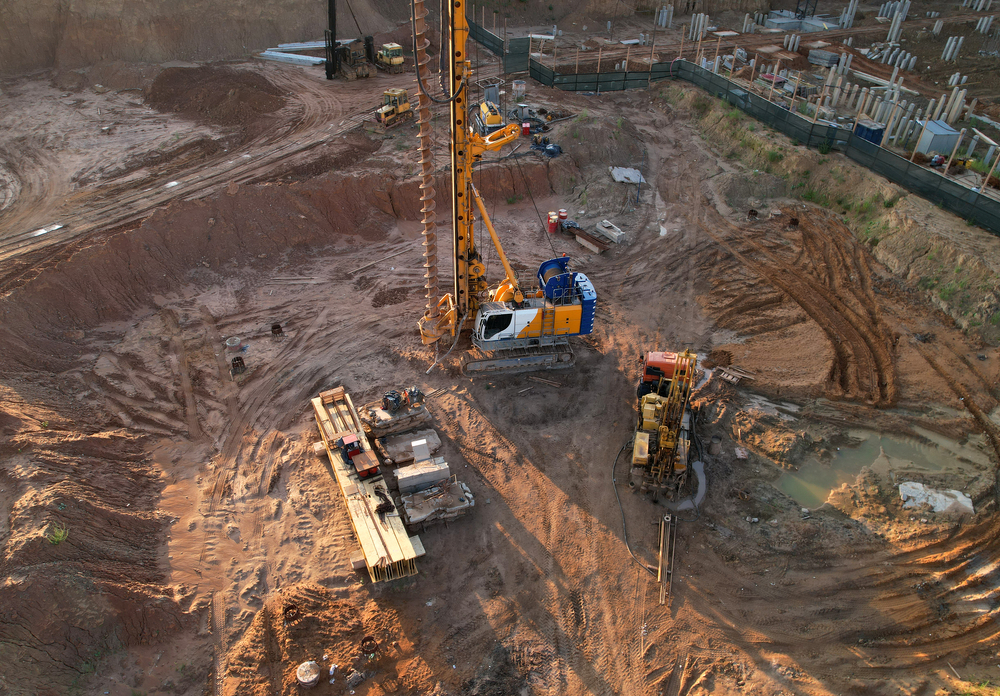Geotheta for Dummies

A geotechnical engineer is a specialized civil engineer who concentrates on the behavior of soil, rock, and other products located below the Planet's surface area. They use scientific principles and engineering methods to analyze the buildings and actions of these materials to support the risk-free and efficient layout, construction, and maintenance of facilities tasks.
They conduct site examinations, gather examples, perform lab tests, and examine information to assess the viability of the ground for building and construction tasks - Consulting Engineers. Based upon their searchings for, geotechnical designers give suggestions for structure style, slope stability, maintaining structures, and reduction of geotechnical hazards. They team up with various other experts, such as designers, architectural engineers, and building teams, to guarantee that geotechnical considerations are integrated right into the overall task layout and execution
By analyzing the habits and homes of soil and rock, they can recognize possible geotechnical risks such as landslides, soil negotiation, or slope instability. Their competence helps avoid failures or accidents that can threaten lives and building. Here are some in-depth responsibilities and responsibilities of a geotechnical engineer: Website Investigation: Geotechnical designers conduct site examinations to collect data on subsurface problems.
They translate the data to understand the residential or commercial properties and actions of the dirt and rock, including their stamina, leaks in the structure, compaction characteristics, and groundwater problems. Geotechnical Analysis and Design: Geotechnical designers examine the information accumulated during site investigations to assess the security and viability of the site for construction jobs. They carry out geotechnical computations and modeling to review elements such as bearing capability, settlement, incline security, side earth stress, and groundwater flow.
3 Easy Facts About Geotheta Described
Foundation Style: Geotechnical engineers play a crucial duty in developing structures that can securely support the desired framework. They assess the dirt conditions and lots requirements to identify the proper foundation kind, such as shallow foundations (e.g., footings), deep structures (e.g (https://yoomark.com/content/httpsgeothetacom)., piles), or specialized strategies like soil renovation. They think about aspects such as settlement restrictions, bearing ability, and soil-structure interaction to develop optimum foundation designs
They review building and construction strategies, screen website activities, and perform field inspections to verify that the layout suggestions are adhered to. If unexpected geotechnical concerns occur, they evaluate the situation and give suggestions for removal or changes to the style. Threat Analysis and Mitigation: Geotechnical engineers analyze geotechnical threats and dangers connected with the job website, such as landslides, liquefaction, or soil erosion.

Cooperation and Communication: Geotechnical engineers function closely with other experts involved in a job, such as architects, architectural designers, and building groups. Effective interaction and cooperation are necessary to integrate geotechnical factors to consider into the general job layout and construction procedure. Geotechnical engineers supply technological knowledge, response inquiries, and make sure that geotechnical requirements are satisfied.
How Geotheta can Save You Time, Stress, and Money.
Here are some sorts of geotechnical engineers: Foundation Designer: Foundation engineers focus on creating and assessing structures for frameworks. They evaluate the dirt problems, load requirements, and site attributes to figure out the most proper foundation type and design, such as superficial structures, deep foundations, or specialized techniques like pile structures.
They assess the factors affecting incline security, such as dirt homes, groundwater conditions, and incline geometry, and establish strategies to avoid incline failings and reduce risks. Quake Designer: Earthquake designers focus on analyzing and designing frameworks to hold up against seismic forces. They evaluate the seismic hazard of a website, examine dirt liquefaction capacity, and develop seismic layout requirements to ensure the safety and security and durability of structures throughout quakes.
They execute area screening, gather examples, and examine the collected information to define the dirt homes, geologic developments, and groundwater problems at a site. Geotechnical Instrumentation Designer: Geotechnical instrumentation engineers concentrate on monitoring and determining the behavior of soil, rock, and frameworks. They install and preserve instrumentation systems that check elements such as dirt settlement, groundwater levels, incline movements, and structural variations to evaluate performance and give early cautions of possible issues.
A Biased View of Geotheta
They have a tendency to be investigatory people, which means they're intellectual, reflective, and investigative. They are curious, methodical, rational, logical, and sensible. Some of them are additionally social, indicating they're kind, generous, cooperative, person, caring, useful, empathetic, sensible, and friendly - Geo Tech Engineering.
In the office setting, geotechnical engineers make use of specialized software program tools to carry out calculations, develop styles, and analyze information. They prepare reports, review task specs, communicate with customers and group members, and coordinate job activities. The workplace setting provides a helpful atmosphere for study, analysis, and partnership with various other experts involved in the job.
Some Ideas on Geotheta You Should Know
They often visit job sites to perform site investigations, analyze geotechnical conditions, and collect data for analysis. These gos to include traveling to various places, sometimes in remote or difficult surfaces. Geotechnical engineers might execute soil tasting, conduct examinations, and monitor building tasks to make certain that the geotechnical elements of the job are being applied correctly.
Geotechnical engineers likewise function in specialized geotechnical research laboratories. In these facilities, they conduct experiments, execute examinations on dirt and rock samples, and evaluate the engineering homes of the products. Geotechnical research laboratory designers function thoroughly in these settings, managing screening tools, operating tools, and recording data. They collaborate with other lab team to guarantee exact and dependable testing results.
Comments on “The Buzz on Geotheta”